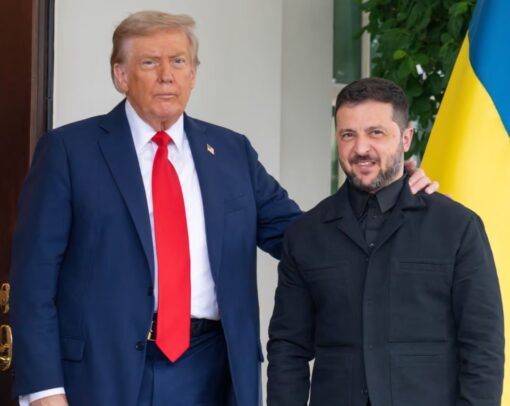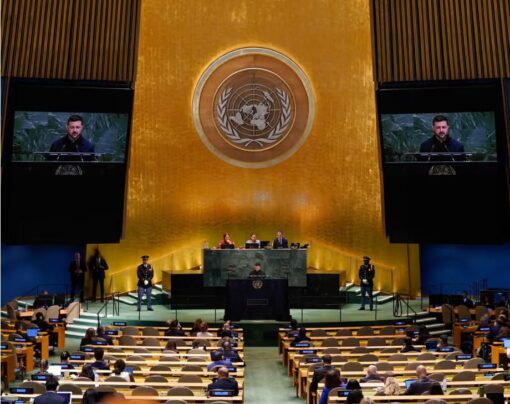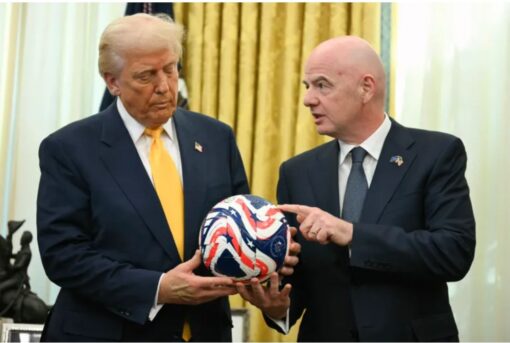NEW YORK – Ukraine’s President Volodymyr Zelenskyy delivered a compelling address at the United Nations General Assembly on Tuesday, warning that the ongoing Russian invasion of Ukraine threatens not only his nation but the entire global order.
Zelenskyy framed national security as a universal right, rather than a privilege reserved for a few nations, and called on world leaders to take immediate action to prevent further escalation of deadly weapons and war.
“Every year that this war goes on, weapons become even more deadly, and only Russia deserves to be blamed for this,” Zelenskyy told the assembly, emphasizing the urgent need for coordinated international pressure.
Speaking from the UN headquarters in New York City, he detailed the extraordinary measures Ukraine has taken to protect its citizens, infrastructure, and agricultural economy from Russian attacks.
“We had to build underground schools and underground hospitals to save lives,” Zelenskyy said. “We even had to teach our farmers how to protect their equipment from drone strikes. Russia’s war has put us in this situation. But do you have protection against similar threats?”

Zelenskyy framed the ongoing war as a test not only of military resilience but of global responsibility. He warned that failing to act now will have far-reaching consequences beyond Ukraine.
“Stopping this war now and within the global arms race is cheaper than building underground kindergartens or massive bunkers for critical infrastructure later,” he urged.
Highlighting the evolving threats posed by technological advances, Zelenskyy pointed to the growing risk of unmanned and nuclear-capable drones.
“Stopping Putin now is cheaper than trying to protect every port and every ship from terrorists with sea drones,” he said. “Stopping Russia now is cheaper than wondering who will be the force to create a simple drone carrying a nuclear warhead.”
The Ukrainian leader made a direct appeal to international partners, stressing that collective action is the only way to halt further escalation. “Use everything we have together to force the aggressor to stop, and only then do we have a real chance that this arms race will not end in catastrophe for all of us,” Zelenskyy said.
He further stressed that military support must be accompanied by broader political and economic pressure on Russia. “If it takes weapons to do it, if it takes pressure on Russia, then it must be done, and it must be done now,” he said. “Otherwise, Putin will keep driving the war forward wider and deeper. And we told you before, Ukraine is only the first.”
Zelenskyy’s speech also addressed the role of Russia’s global trade partners, arguing that economic complicity fuels Moscow’s aggression. “War has already reached too many people to pretend it has nothing to do with you,” he said. “It depends on you whether you help peace or continue trading with Russia and helping Russia to fund this war.”
By framing national security as a human right, Zelenskyy appealed to the assembly’s broader moral and legal responsibilities. “If security guarantees work for Ukraine—something more than just friends and weapons—it will mean that people were able to make national security not a privilege for a few nations, but a right for everyone,” he said.
Zelenskyy also publicly acknowledged the support of former U.S. President Donald Trump, highlighting recent discussions between the two leaders. “I want to thank President Trump for his continued support after our talks on Tuesday,” he said.
The Ukrainian leader concluded with a call for immediate international engagement. “So don’t stay silent while Russia keeps dragging this war on. Please speak out and condemn it. Please join us in defending international law and order. People are waiting for action.”
Observers say Zelenskyy’s speech signals a broader push by Ukraine to position itself as a moral and strategic ally in global security efforts, framing the Russian conflict as a testing ground for the entire international system. Analysts also note the significance of his argument that defending Ukraine is inseparable from preventing wider destabilization of global security.
“Zelenskyy is not just asking for weapons; he’s asking for a recognition that national security is universal,” said Dr. Mariana Kovalenko, a European security analyst. “This is about setting a precedent where all nations have the right to protection against aggression, not just the most powerful states.”
The address comes amid heightened concerns about the acceleration of the global arms race, particularly with the proliferation of drone and missile technology.
Experts warn that without immediate intervention, regional conflicts could evolve into larger, unpredictable crises. “The weapons being deployed in Ukraine today will shape the battlefield tomorrow, and the world cannot afford complacency,” Kovalenko said.
Zelenskyy’s speech also included practical warnings about infrastructure vulnerability. Ukraine’s experience has revealed how modern warfare targets critical civilian and industrial systems.
“We are building bunkers and shelters because every facility, every port, every power station is a potential target,” Zelenskyy explained. “We hope you will take lessons from this before it is too late in your own countries.”
In addition to military measures, Zelenskyy emphasized the importance of economic sanctions, international cooperation, and moral accountability.
He urged nations to reevaluate relationships with Russia, noting that continued trade effectively bankrolls the ongoing invasion. “You cannot be neutral when war touches millions of lives,” he said.
While much of the UN General Assembly remains focused on traditional diplomacy, Zelenskyy’s message underscored the intersection of national security, human rights, and international law.
By stressing that security should be accessible to all nations, Ukraine’s president reframed the conflict as a global responsibility rather than a purely regional issue.

The speech drew immediate reactions from several world leaders, with many noting the urgency of his warnings. A European diplomat, speaking on condition of anonymity, said, “Zelenskyy’s framing of national security as a human right is a powerful reminder that the war in Ukraine is a test for the international community. We must act decisively.”
As Russia continues its campaign, Zelenskyy’s UN address may serve as a blueprint for advocacy and diplomatic engagement. Analysts suggest his emphasis on collective action and universal rights could resonate with smaller nations that feel threatened by modern warfare technology.
In closing, Zelenskyy stressed that the fight is not just about Ukraine but about ensuring that no nation is left defenseless in a rapidly changing world. “We are the first line, yes, but the lesson is for everyone,” he said. “National security should not be a privilege for the few—it must be a right for all.”
With global attention focused on his remarks, Zelenskyy has placed the responsibility for stopping Russia squarely on the international community. His call for immediate action—military, economic, and diplomatic—signals a shift in Ukraine’s strategy from defensive resilience to proactive global engagement.
“The time to act is now,” Zelenskyy concluded. “Every day we delay, the cost grows—not just for Ukraine, but for the world. Make security a right, not a privilege. Stand up and act.”
Stay updated swiftreportnow


